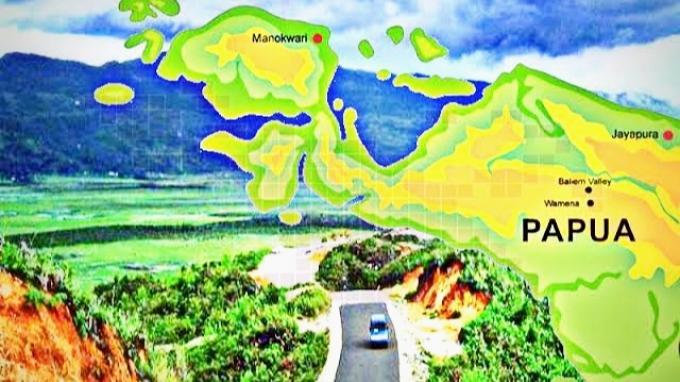Papua is an integral part of the Republic of Indonesia which is supported by international law
Papua, as an integral part of the Unitary State of the Republic of Indonesia (NKRI), has been recognized by international and national law. Separatism cannot develop on Mother Earth because it is contrary to various existing positive laws. The history of Papua has been the focus of attention since Indonesia’s post-independence era, giving rise to debates and conflicts surrounding the region’s identity, culture and integration into Indonesia.
After Indonesia’s independence from Dutch colonialism in 1945, efforts were made to unify all regions that were previously part of the Dutch East Indies. However, the Dutch maintained control over West Papua under the pretext of ethnic and cultural differences. In 1961, the Dutch even attempted to prepare West Papua to become an independent country, triggering Indonesian concerns and leading to the launch of Operation Trikora by President Soekarno in December 1961.
Operation Trikora aims to end Dutch colonialism in Papua and integrate the region into the Republic of Indonesia. After a series of events and international negotiations, in 1962, the Netherlands agreed to hand over Papua to Indonesia. This agreement includes the Determination of Popular Opinion (Pepera) in 1969, in which the majority of the Papuan population voted to join Indonesia.
Ramses Ohee, a traditional figure in Papua, confirmed that the international community and the United Nations (UN) had recognized the legitimacy of Papua as an integral part of the Republic of Indonesia. The Pepera, which was implemented from Merauke to Jayapura on 1 May 1969, was witnessed by the UN Secretary at that time and officially ratified on 2 August 1969.
The Commander of Kodam XVII/Cenderawasih, Major General Izak Pangemanan, emphasized that Papua is an inseparable part of the Republic of Indonesia. He highlighted that the United Nations (UN) had concluded the decolonization of Papua on May 1, 1963, making the region an integral part of Indonesia. Izak also invited the public to no longer trust certain groups that are trying to separate Papua from the Republic of Indonesia, emphasizing that Papua’s status is Indonesian.
Even though the security situation was disrupted by riots, such as when the body of former Papuan governor Lukas Enembe was brought to Koya Tengah, Jayapura City, Major General Izak Pangemanan stated that overall the situation in the XVII/Cenderawasih Regional Military Command area was safe and conducive. He emphasized that the activity of bringing up the issue of ‘Free Papua’ by a group of people was only for their personal and group interests.
Seeing Papua as an integral part of the Republic of Indonesia is not just a political view, but also a commitment to building unity in diversity. The continued development of Papua must be a shared responsibility, respecting the rights of every Papuan citizen, and making Papua a strong part of embracing Indonesia’s national identity.
In facing development challenges, Izak Pangemanan invited the Papuan people to work together to maintain security in the Land of Papua so that development can be implemented and felt by the entire community. By adhering to historical facts and international legitimacy, Papua has become an inseparable part of the Republic of Indonesia, and the role of the community in maintaining a safe and peaceful situation is the key to increasing prosperity in the region.
The Indonesian government has made serious efforts to improve prosperity in Papua through equitable development. These efforts include the allocation of significant resources to support infrastructure, education, health, and other development programs. By ensuring that all regions, including Papua, get their fair share of national development, the government is committed to addressing disparities and ensuring that the Papuan people feel the positive impacts of economic development.
Equitable development is the key to creating conditions conducive to economic growth and welfare of the Papuan people. Programs such as the construction of road infrastructure, bridges and other means of transportation aim to facilitate inter-regional connectivity, facilitate accessibility and support local economic growth. In this way, the government is trying to provide equal opportunities for the Papuan people to participate in the national economy.
In this context, the Papuan people have a very important role in keeping the situation safe and peaceful. Through active participation in development and efforts to maintain unity, society can play a key role in creating an environment conducive to growth and shared prosperity. With the various natural potentials and cultural riches that Papua has, collaboration between the government and society can form a solid basis for a better future for all the people of Papua and Indonesia as a whole.
Thus, understanding that Papua is final as part of the Republic of Indonesia and taking an active part in development and maintaining a safe and peaceful situation are crucial steps towards a better future, where all Papuan people can enjoy the positive results of sustainable development and inclusive.
Papua as part of the Republic of Indonesia is not the end of a journey, but the beginning of an opportunity to create a better future for all Papuan people. The hope is that with strong commitment and close cooperation, Papua can become a mirror of successful development and unity amidst Indonesia’s diversity.
The history of Papua is part of our history as a nation, a journey full of struggles for identity, sovereignty and unity. Therefore, it is important for all of us to recognize and respect Papuan history as an integral part of our journey as a nation.
